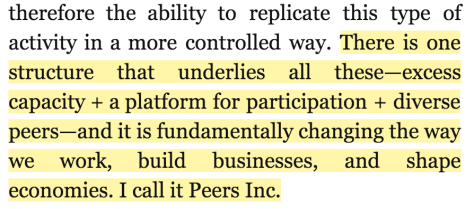Consulting around technological change is a very large market indeed, dominated by accounting and strategy consulting firms – if you were going to build a firm from scratch to compete with the big four/five/six professional service firms, you’d need to spend a lot of money over a long period of time, wouldn’t you?
When Tuttle started, eight years ago, I called it a prototype but I wasn’t quite sure that I knew what it was a prototype for. At the time it felt like we were making a new kind of space for work, and that looked like the emerging co-working model, of which, at the time, there were no real examples here in the UK. So yeah, we were probably going to be a co-working space. But then we carried on meeting and it turned out that even when there were co-working spaces, there was still something to be done, there was still much life in the marketplace for people and ideas that is two hours between 10 and midday every Friday, somewhere in London.
We created together a consulting offer, which we took out with some success, but most of the economic, commercial and energetic work happened in small autonomous groups, peer-to-peer.
I’ve been thinking again recently about how we can open up aggregated knowledge and skills, sliced in interesting ways to help businesses and large organisations deal with technological change.
Silicon Valley may be bubbling right now, but it’s unlikely to ever stop lobbing over these little bombs of change and disruption in the form of new hardware and software and ideas for organising the world more effectively. When I’ve spoken to people recently about VR, Blockchain, IoT and Artificial Intelligence, they’ve expressed weariness in the face of yet another wave of tech. Most people my age say “We lived through the introduction of PCs to the workplace, then we had to deal with e-mail and the web and now you’re saying it’s all going to be turned upside down again?” Well yes and the biggest mistake we can make is to think this is the last round.
Silicon Valley is an engine for ongoing disruption and if we can accept that, stop fighting it and instead accept that we need people who can map out what’s really going on; distinguish between hype and those things that look crazy but are true; and help you make good decisions about what to do next.
Tuttle can do this. We have many people in our near and extended network who have immersed themselves in watching how technological change happens and coming up with new processes for dealing with it.
I’ve been thinking about how to unlock the capacity that we have in the network. And so I’ve been looking at co-operative business models, blockchain-based methods for recompensing creative work, internal currencies etc.
And then on Tuesday night I met Robin Chase and finally looked properly at the ideas in her book Peers Inc. There, in the introduction, was a sentence that echoed what I was thinking and helped me make sense of our network in a different way.

We are definitely a group of diverse peers – one of the sticking points for many people hearing about us for the first time is “If these people don’t all have something specific in common, then what do they talk about, and how can it be of any value?”
We have a platform for participation – it’s every Friday morning at 10am for a couple of hours, it’s a marketplace where ideas and opportunities are traded. It’s a very very limited form, compared to what it could be but because we’ve practiced it for many years now, some of us understand it very well. I’m starting to think about what a web platform for this might look like.
And we have excess capacity, as I wrote yesterday – lots of people with underused or misused brains.
What if we could leverage these things together in the service of large organisations?
Which is why I just tweeted:
That’s what we’re going to make next.
Join me, comment, argue, nod vigorously, come and help, whatever works for you – but if you need help with thinking about how you can ride the waves of technological change instead of being swamped by them, my friends and I are the ones you should be talking to.









